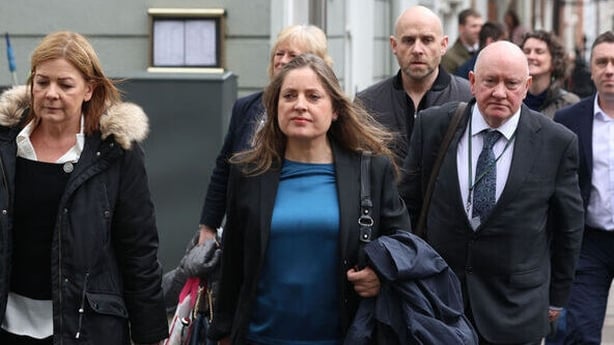The Chair of the NUJ's Dublin Broadcasting Branch has told the Oireachtas Media Committee that revelations around RTÉ which emerged last summer were "devastating" for staff, adding that "it was like a dam bursting".
Representatives from unions including the NUJ, SIPTU, Connect and Unite appeared before the committee to discuss governance and culture issues at RTÉ.
Members of the committee said that they were keen to discuss the wide range of issues that involve RTÉ workers, including contracts, conditions and upcoming redundancies.
Taoiseach Simon Harris earlier told the Dáil that "staff at RTÉ have been put through the ringer" and "have done nothing wrong and should be supported".
Mr Harris said that RTÉ "let down the public" but that he differentiates between the company and the staff.
Responding to Fianna Fáil TD Christopher O'Sullivan, who had said the committee wanted to hear the experiences of staff at the broadcaster, the NUJ's Emma O Kelly said that "Out of the glare of the media nobody seemed that interested before, but inside in RTÉ we were fighting on a number of fronts."
"Then in the summer it was upsetting, but it was like a dam bursting. Colleagues of mine were very brave. I could speak in my NUJ role, but others spoke out in their personal capacity.
"We had hoped that there would be catalyst for change, but almost a year on, while there have been changes, we still feel that we are flailing.
"I have to bring it back to a daily struggle. In the newsroom for example it is a lottery to see which printer is working. Our building is falling down. It's a listed building and we would urge you all to do what you can to help us with funding, the level and the model of funding."
In its opening statement to the committee, the NUJ said that the voice of RTÉ staff "has been missing from discourse" about the series of scandals that have hit the broadcaster in the last year.
Ms O Kelly was joined at the committee by the NUJ's Irish Secretary Séamus Dooley, as well as representatives from SIPTU, Connect and Unite.
"RTÉ has been starved of necessary funding for decades by successive governments," Ms O Kelly said.
"When we spoke out over the summer, it was in direct response to the immediate crisis, but the real wellspring was the deep frustration and powerlessness we have felt for years because of severe underfunding," she said.
She added: "We struggled as best we could, striving to deliver quality output as budgets were slashed."
"The licence fee model is no longer fit-for-purpose. Public service media in this country urgently needs to be supported by a new sustainable and equitable funding model."

The meeting took place ahead of the anticipated release of two reviews commissioned last year by Minister for Media Catherine Martin into problems facing the national broadcaster.
Both reviews were originally due in January, six months after they were commissioned, but neither has been published yet and there is also no date for their publication.
In her opening statement, Teresa Hannick of SIPTU said that "the uncertainty must end".
"What our members expect is full transparency and the creation of an action plan for the national broadcaster which places a commitment to public service at its centre and not just a 'slash and burn' plan that threatens to reduce staffing levels and terms and conditions of employment."
Following opening statements, a number of issues were raised including concerns about ongoing inconsistencies of employment contracts, the terms that some workers use to describe their situation, and bogus self-employed contracts.
Fine Gael TD Brendan Griffin read some of the contributions the committee received from workers, with many describing their frustration at the fees RTÉ is paying to legal firms instead of protecting workers.
Sinn Féin's Imelda Munster then questioned the role of the unions saying that some workers say they were ignored by them when the problems with the employment contracts emerged.
The unions defended their roles, with Mr Dooley pointing out that going back over 20 years he was involved in advising workers on unsatisfactory contracts through the Goodbody review.
Other issues raised by the committee included concerns from Fair City, both in terms of employment contracts with the obligation on actors having to get permission for external work from RTÉ even when they are not staff, and worries about the impact of pausing production this summer when filming will not take place.
The NUJ confirmed again that it is concerned that Government funding for RTÉ seems to be contingent on job cuts.
Read more: 7 questions ahead of RTÉ being discussed at Media Committee
Connect said in relation to public service broadcasting that "as billionaire moguls buy both traditional and new social media outlets to promote their agenda, an independent public service that can report without fear or favour in a necessary counterbalance".
The Unite union focused on "procedures and processes relating to the misclassification of workers’ employment status and impacts thereof".
Brendan Byrne from Unite - who represents a small number of craft workers in RTÉ - told the committee that it is disappointed that people who endured "bogus self-employment" contracts were not able to address the committee directly.
In his opening statement he added: "In 2021, Unite put forward proposals in response to the draft recommendations on bogus self-employment," urging that the recommendations should be endorsed by the media committee.
The statement outlined that they include establishing "an appropriately resourced unit within the Workplace Relations Commission to carry out in-house investigation, on-site inspection and adjudication functions relating to employment status".
Read more: New RTÉ chair vows to restore trust







